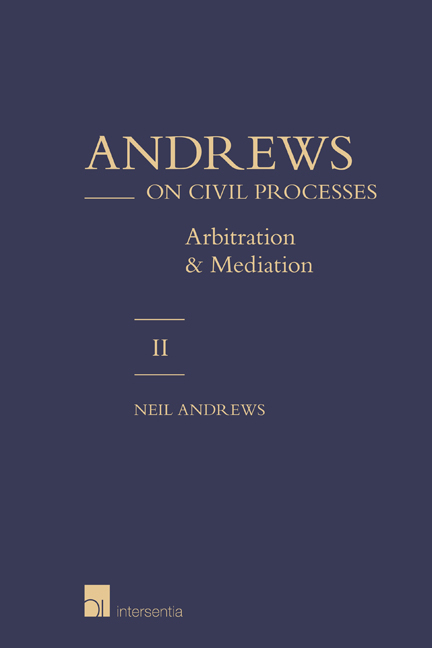Book contents
- Frontmatter
- Dedication
- CONTENTS VOLUME I
- Contents
- Table of Cases
- Table of Statutes
- Table of Statutory Instruments
- PART I MEDIATION
- PART II ARBITRATION
- Chapter 3 Commercial Arbitration: What Is It and Why Choose It?
- Chapter 4 The Major Principles of Arbitration and Litigation: A Comparison
- Chapter 5 Fundamental Features of English Arbitration
- Chapter 6 ‘The Seat’ and the Range of Relevant Laws
- Chapter 7 ‘Arbitrability’: Public Policy Limitations upon the Scope of Arbitration
- Chapter 8 A Confidential Process
- Chapter 9 Arbitration Agreements
- Chapter 10 Courts Giving Effect to Arbitration Agreements
- Chapter 11 Commencement of the Submission and Time Issues
- Chapter 12 The Tribunal's Appointment, Tenure and Immunity
- Chapter 13 Pre-Hearing Proceedings
- Chapter 14 The Hearing
- Chapter 15 Final Remedies, the Award, and Correction of the Award by the Tribunal
- Chapter 16 Fees, Expenses and Recoverable Costs
- Chapter 17 Arbitration Awards: Issues of Finality and Res Judicata
- Chapter 18 Challenges to English Arbitral Awards under English Law
- Chapter 19 English Enforcement of English Awards
- Chapter 20 Enforcement under the New York Convention (1958)
- PART III CONSUMER ADR
- Select Bibliography
- Index to Volumes I and II
Chapter 9 - Arbitration Agreements
from PART II - ARBITRATION
Published online by Cambridge University Press: 13 December 2017
- Frontmatter
- Dedication
- CONTENTS VOLUME I
- Contents
- Table of Cases
- Table of Statutes
- Table of Statutory Instruments
- PART I MEDIATION
- PART II ARBITRATION
- Chapter 3 Commercial Arbitration: What Is It and Why Choose It?
- Chapter 4 The Major Principles of Arbitration and Litigation: A Comparison
- Chapter 5 Fundamental Features of English Arbitration
- Chapter 6 ‘The Seat’ and the Range of Relevant Laws
- Chapter 7 ‘Arbitrability’: Public Policy Limitations upon the Scope of Arbitration
- Chapter 8 A Confidential Process
- Chapter 9 Arbitration Agreements
- Chapter 10 Courts Giving Effect to Arbitration Agreements
- Chapter 11 Commencement of the Submission and Time Issues
- Chapter 12 The Tribunal's Appointment, Tenure and Immunity
- Chapter 13 Pre-Hearing Proceedings
- Chapter 14 The Hearing
- Chapter 15 Final Remedies, the Award, and Correction of the Award by the Tribunal
- Chapter 16 Fees, Expenses and Recoverable Costs
- Chapter 17 Arbitration Awards: Issues of Finality and Res Judicata
- Chapter 18 Challenges to English Arbitral Awards under English Law
- Chapter 19 English Enforcement of English Awards
- Chapter 20 Enforcement under the New York Convention (1958)
- PART III CONSUMER ADR
- Select Bibliography
- Index to Volumes I and II
Summary
INTRODUCTION
It is prudent to draft the arbitration agreement in some detail to avoid the danger of uncertainty and confusion. Russell (2007) supplies a helpful checklist of issues that might be addressed. There are also helpful practical comments on this matter in Finizio and Speller (2010). Lewison (2011) notes various leading propositions established within the case law concerning the interpretation of arbitration agreements. If the parties wish to nominate, for example, the LCIA, its website provides the following standard arbitration clause for future disputes:
‘For contracting parties who wish to have future disputes referred to arbitration under the LCIA Rules, the following clause is recommended. Words/spaces in square brackets should be deleted/completed as appropriate.
“Any dispute arising out of or in connection with this contract, including any question regarding its existence, validity or termination, shall be referred to and finally resolved by arbitration under the LCIA Rules, which Rules are deemed to be incorporated by reference into this clause.
The number of arbitrators shall be [one/three].
The seat, or legal place, of arbitration shall be [City and/or Country].
The language to be used in the arbitral proceedings shall be [].
The governing law of the contract shall be the substantive law of [].”’
(This next note cites LCIA's standard arbitration clause for existing disputes).
The English Arbitration Act 1996 requires the arbitration agreement (including an individual ‘submission agreement’) to be in writing (including procedural amplification of the arbitration agreement during the course of a reference). An unwritten arbitration agreement is not lacking in legal effect; but it will not be governed by the Act.
The Arbitration Act 1996 contains a broad definition of the phrase ‘in writing’ (‘much wider than the Model Law’, Article 7(2); on the ‘oral option’ under the UNCITRAL Model Law, see Redfern and Hunter).
In essence, the following elements apply for the purpose of the Arbitration Act 1996 (England and Wales):
(i) there is no need for the agreement to be signed by the parties, or indeed signed at all;
(ii) writing includes information ‘being recorded by any means’;
(iii) the agreement can be:
(a) itself made in writing; or
(b) formed by exchanging written communications; or
(c) evidenced in writing; or
(d) made by reference (and see next paragraph) to written terms (containing an arbitration agreement); or
- Type
- Chapter
- Information
- Andrews on Civil ProcessesArbitration and Mediation, pp. 195 - 210Publisher: IntersentiaPrint publication year: 2013

